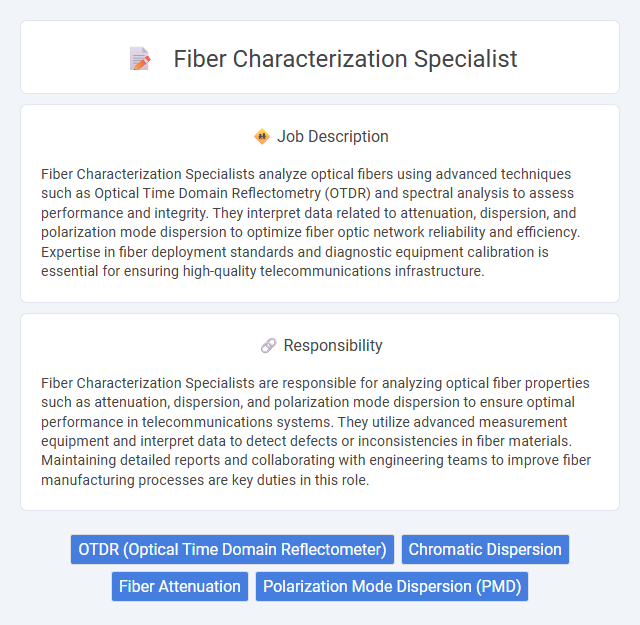
Fiber Characterization Specialists analyze optical fibers using advanced techniques such as Optical Time Domain Reflectometry (OTDR) and spectral analysis to assess performance and integrity. They interpret data related to attenuation, dispersion, and polarization mode dispersion to optimize fiber optic network reliability and efficiency. Expertise in fiber deployment standards and diagnostic equipment calibration is essential for ensuring high-quality telecommunications infrastructure.
Individuals with strong attention to detail and a background in materials science or engineering are likely well-suited for the role of Fiber Characterization Specialist. People who excel in analytical thinking and possess patience for precise measurements may find themselves thriving in this position. Those uncomfortable with meticulous laboratory work or repetitive testing might encounter challenges adapting to the job's demands.
Qualification
A Fiber Characterization Specialist requires a strong background in materials science, optics, or electrical engineering, typically holding a bachelor's or master's degree in these fields. Proficiency in advanced fiber optic testing techniques, including spectral analysis, attenuation measurement, and refractive index profiling, is essential. Experience with precision instrumentation such as optical time-domain reflectometers (OTDR) and interferometers is highly valued for accurate fiber characterization.
Responsibility
Fiber Characterization Specialists are responsible for analyzing optical fiber properties such as attenuation, dispersion, and polarization mode dispersion to ensure optimal performance in telecommunications systems. They utilize advanced measurement equipment and interpret data to detect defects or inconsistencies in fiber materials. Maintaining detailed reports and collaborating with engineering teams to improve fiber manufacturing processes are key duties in this role.
Benefit
Fiber Characterization Specialists likely experience enhanced career growth opportunities due to their specialized expertise in fiber optics. They may benefit from working with cutting-edge technologies, which could lead to increased job security and higher earning potential. Exposure to innovative projects might also contribute to skill advancement and professional recognition in the telecommunications or materials science industries.
Challenge
Fiber Characterization Specialists likely face the challenge of accurately measuring and analyzing complex optical fibers under varying environmental conditions. They probably need to adapt quickly to emerging technologies and evolving testing standards to ensure precise data collection. Troubleshooting irregularities in fiber performance might also demand innovative problem-solving skills and meticulous attention to detail.
Career Advancement
Fiber Characterization Specialists gain expertise in analyzing optical fiber properties, enabling advancement into senior research or engineering roles within telecommunications and photonics industries. Mastery of techniques such as optical time-domain reflectometry and spectral analysis positions professionals for leadership in product development and innovation teams. Continuous skill growth in fiber optics measurement technologies accelerates career progression toward managerial and technical expert roles.
Key Terms
OTDR (Optical Time Domain Reflectometer)
A Fiber Characterization Specialist conducts detailed analysis of fiber optic cables using OTDR technology to detect faults, measure signal loss, and ensure optimal performance. Proficiency in interpreting OTDR traces is critical for identifying splices, connectors, and attenuation levels along fiber routes. This role supports network reliability and maintenance by providing precise data essential for troubleshooting and validating fiber integrity.
Chromatic Dispersion
Fiber Characterization Specialists analyze and measure chromatic dispersion to ensure optimal performance of optical fibers in telecommunications. Precise assessment of chromatic dispersion parameters helps mitigate signal distortion and maintain high data transmission rates over long distances. Expertise in advanced testing equipment and simulation software is essential for accurate dispersion profiling and network optimization.
Fiber Attenuation
Fiber Characterization Specialists analyze fiber attenuation to evaluate signal loss in optical fibers, ensuring optimal network performance and reliability. Using precision instruments such as optical time-domain reflectometers (OTDR) and power meters, they measure attenuation rates to identify defects, connector losses, and splicing issues. Accurate fiber attenuation assessment is critical for maintaining high-quality telecommunications infrastructure and reducing downtime in fiber optic systems.
Polarization Mode Dispersion (PMD)
A Fiber Characterization Specialist with expertise in Polarization Mode Dispersion (PMD) conducts precise measurements and analysis of optical fiber performance to ensure minimal signal distortion in high-speed communication networks. Proficiency in advanced PMD measurement techniques and interpretation enables optimization of fiber design and enhancement of transmission quality. Experience with industry-standard equipment and software tools is essential for accurate fiber characterization and troubleshooting of PMD-related impairments.
 kuljobs.com
kuljobs.com